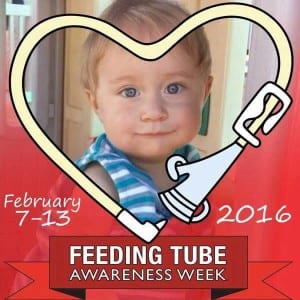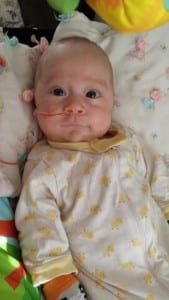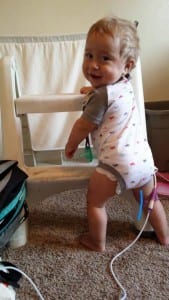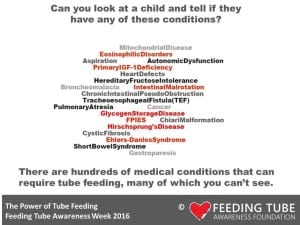 Today at noon in the Sky View Conference Room on the third floor of the Dixie Regional Medical Center (400 East Campus Road), is a informative class on tube feeding. The class is part of Tube Feeding Awareness Week.
Today at noon in the Sky View Conference Room on the third floor of the Dixie Regional Medical Center (400 East Campus Road), is a informative class on tube feeding. The class is part of Tube Feeding Awareness Week.
 Recently, Alexandrea Gonzales Helm (a tubie mother herself) asked other tubie mothers what they would like to make parents, children, and doctors more aware of in regards to tubies. Here are some of their thoughts.
Recently, Alexandrea Gonzales Helm (a tubie mother herself) asked other tubie mothers what they would like to make parents, children, and doctors more aware of in regards to tubies. Here are some of their thoughts.
For the public
“That [the feeding tube] is a positive aspect of many tubies’ lives. We hear “aww, poor baby” a lot, and I appreciate the sentiment, but I always return with, ‘She is doing so much better  now that she has the feeding tube!’ And people are usually quick to change their perspective and reply how amazing science is or how great she looks. I also want people to know that many (most?) of the conditions that necessitate a feeding tube are completely invisible…don’t judge a person’s situation by how “good” they look. And lastly, but most importantly, I want people to know that everything possible was often done in a tubies’ life before they got their tube, that the decision was hard. It’s not because we’re lazy. It’s not because she’s a picky eater. It’s not because we didn’t try everything humanly possible first. She has a tube because it was the only option left”
now that she has the feeding tube!’ And people are usually quick to change their perspective and reply how amazing science is or how great she looks. I also want people to know that many (most?) of the conditions that necessitate a feeding tube are completely invisible…don’t judge a person’s situation by how “good” they look. And lastly, but most importantly, I want people to know that everything possible was often done in a tubies’ life before they got their tube, that the decision was hard. It’s not because we’re lazy. It’s not because she’s a picky eater. It’s not because we didn’t try everything humanly possible first. She has a tube because it was the only option left”
“It’s not contagious. If you have questions, just ask them already! I’d be more than happy to explain what it is to your child. No, a few days with you won’t “fix” him. This thing helps him feel better. He’s not an “oh, you poor thing.”
“Please think before you talk…we as parents question our decisions daily. We spend agonizing hours debating, researching, and crying. We do not need your callous opinions”
For mothers of tube feeding children
“It’s going to be okay, I promise…it will be hard and scary and frustrating and exhausting at times, but it will be okay. Nobody expects you to do it perfectly…live and learn and move on. Seek out other tubie families for support and encouragement. Most of all, do what you can  to take care of yourself and remove the negativity of others from your life…surround yourself with positive people.”
to take care of yourself and remove the negativity of others from your life…surround yourself with positive people.”
“It’s not a failure on your part. It’s not as scary as it seems. It will be okay, and your family’s life will be better because of the tube”
“EVERYONE messes up. Don’t hate yourself over it. Five years down the road and I am STILL making mistakes. Laugh it off and move on.”
“You’re not alone. Seek out others in similar positions…It’s okay to be frustrated but try not to let it consume you because sometimes you might miss out on the rosy parts of life.”
For Doctors of tube feeding children
“We’ve been through the wringer several times over, and all we want you to do is listen. Respect us as a vital member of our child’s team since nobody knows our kiddos better than we do. Help us get what our kiddos need, keep us informed, admit when you don’t have the answers. If feeding tubes are not your specialty, read up on them before you try having an intelligent conversation with me about it. Don’t push…give me the facts and help me decide, but don’t be a bully. And most importantly, I will likely cry in your office at some point, and that’s when I need your support that I’m doing okay, that [my baby] is doing okay, and that it’s all going to be okay.”
“Seek out information for your patients who are getting tubes. Do not leave them to find resources on their own. Don’t make it harder than it needs to be.”
“You’re not always right, and that’s okay. Be open to the suggestions that parents and the tubies themselves have. Be open to safe experimentation.”
 KerryAnn, the NICU lactation specialist is in charge of the class, scheduled the event during the typical lunch hour in hope that some pediatric doctors from St. George can make it. She believes that it would be beneficial for the community.
KerryAnn, the NICU lactation specialist is in charge of the class, scheduled the event during the typical lunch hour in hope that some pediatric doctors from St. George can make it. She believes that it would be beneficial for the community.
For more information on tube feeding awareness week, you can go to http://www.feedingtubeawareness.org/



